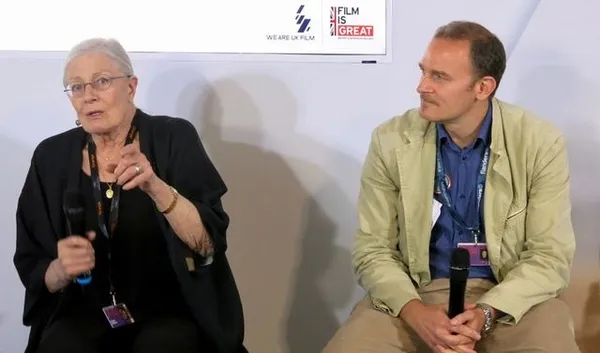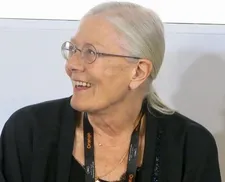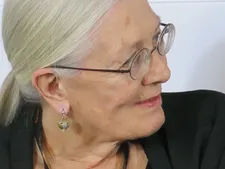 |
| Vanessa Redgrave Photo: Richard Mowe |
Vanessa Redgrave received her first award in Cannes for Morgan: A Suitable Case For Treatment in 1966. Last year she was in attendance for a restored copy of Howard’s End in Cannes Classics. Now she has returned again to make her debut as a director at the age of 80 with Sea Sorrow, a documentary about the refugee crisis, directed by her son Carlo Nero. It features such star performers as Ralph Fiennes and Emma Thompson and a key agitator in Parliament for helping the plight of refugees, Lord Alf Dubs.
Q: What was the impetus for making Sea Sorrow at this particular time?
 |
| "It became obvious that it would be her film and she would have to direct it" - Carlo Nero Photo: Richard Mowe |
Vanessa Redgrave: The refugees started having a hard time escaping a long time ago because the wars have been going for ages. The war in Syria started after the giant demonstrations of the Syrian people in 2012, and that heightened the crisis in these countries and in these wars. It came about with the realisation that it is not enough to be raising money, attending fund-raisers and even organising a fund-raiser which we did for the British Refugee Council. What brought it home to me and everybody else was that day in September last year when the photographs appeared in the newspapers of the little Kurdish boy who drowned with his sister and his mother - drowned in a two kilometre crossing in a rubber boat. I learned later from playwright and dear friend Martin Sherman who is in our film, that there is a commercial ferry that crosses the stretch of water several times a day. Why weren’t this poor family, seeking refuge from terrifying wars, given free ferry tickets? It would not have cost too much to allow them to cross safely. That little boy is part of a much bigger picture …
Q: Why did you decide to trust Vanessa to direct this film?
Carlo Nero: She has this habit of coming up with these amazing projects which previously I have tried to get her to direct but as we progressed with this one it became obvious that it would be her film and she would have to direct it. She was the only person who could steer the ship in the right direction. Ultimately my job was to assist her in every possible way. It was very much a creative collaboration, rather than me just sorting out the logistics. There was not a script at such but just ideas and we had to piece these elements together, but not obviously a conventional story, because it is certainly not that in structure and style. We decided that we had to make it personal because once the viewers find out that Vanessa had been a child evacuee in her own country in the Second World War and the Blitz and the experience of that shaped the years that followed. It is about refugees but it is also a very personal story.
Q: How did you marry all the elements together because there is archival footage and talking heads and so on?
 |
| "Why weren’t this poor family, seeking refuge from terrifying wars, given free ferry tickets?" - Vanessa Redgrave Photo: Richard Mowe |
CN: It was challenging to find all the material and then to work out some kind of structure from it all. We sifted through thousands of archive photographs and film. Vanessa was clear about certain things which was that we had to use Shakespeare’s The Tempest in one of the scenes and the Sylvia Pankhurst letter to The Guardian in 1938 about two Jewish refugee ladies she was trying to take in but the Government of the day would not let her. We did not want to do it in an obvious way. It is a rally cry and it has an agenda to make people know more, and to allow people to breathe and reflect on the points made in the film. We call it a meditation but it is also trying to galvanise people.
Q: Have we become inured to the plight of refugees?
VR: Yes and we need to get through the hard layer on the top of our brains and our hearts which I have as much as other people. It is not about preaching to the converted. This is our future as much as the refugees’ future. When the newspapers try to say that some of them are older than children and are more like 18, then they should realise that you would look 18 if you had been through the hell they have been through. We did not baulk at showing things like young men trying to get out of the boat first and stepping over young girls to do so. That is what life is like in those circumstances. If the film helps to save even one life it will have been worth it. It is not as difficult to sort out as governments seem to make out.
Q: How did you get people like Ralph Fiennes reading The Tempest and Emma Thompson involved in reading the Pankhurst letter?
VR: I have known Emma since Howard’s End and she is a fantastic actress. It was about her ability and her field of energy rather than using her name. She read the Pankhurst letter from the Twenties and excerpts from the Manchester Guardian of other periods to provide a picture of the refugees over the decades. I did not direct her - I left it up to her. And it was the same with Ralph Fiennes for The Tempest because Shakespeare has always had the effect that people think he is talking about what they are going through.
Vanessa Redgrave: “We need to get through the hard layer on the top of our brains and our hearts …”
Carlo Nero: “It became obvious that it would be her film …"





















